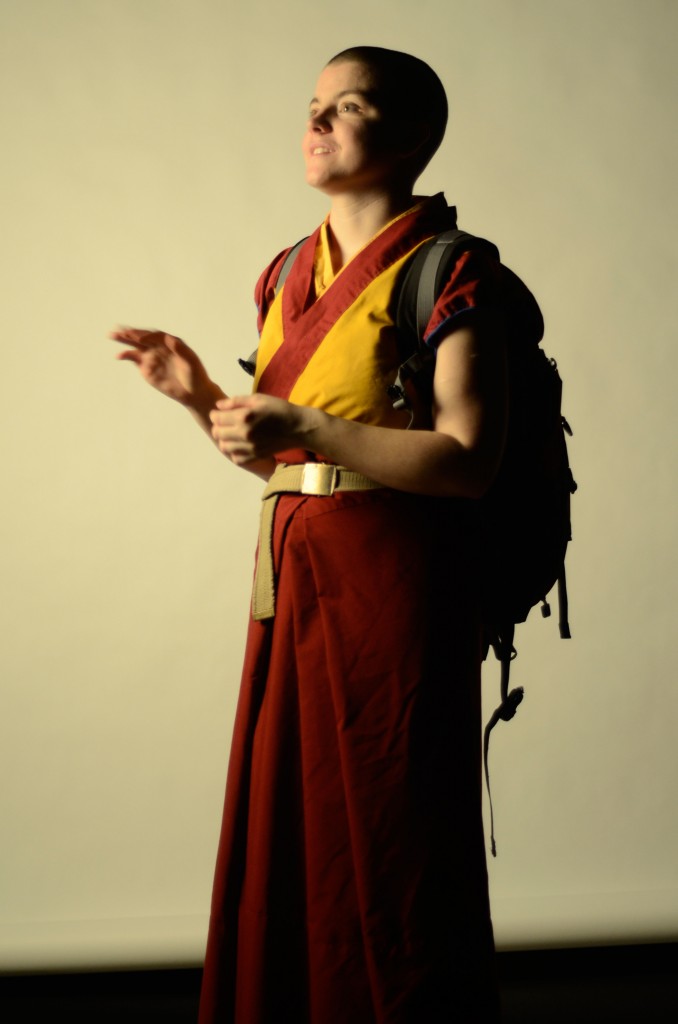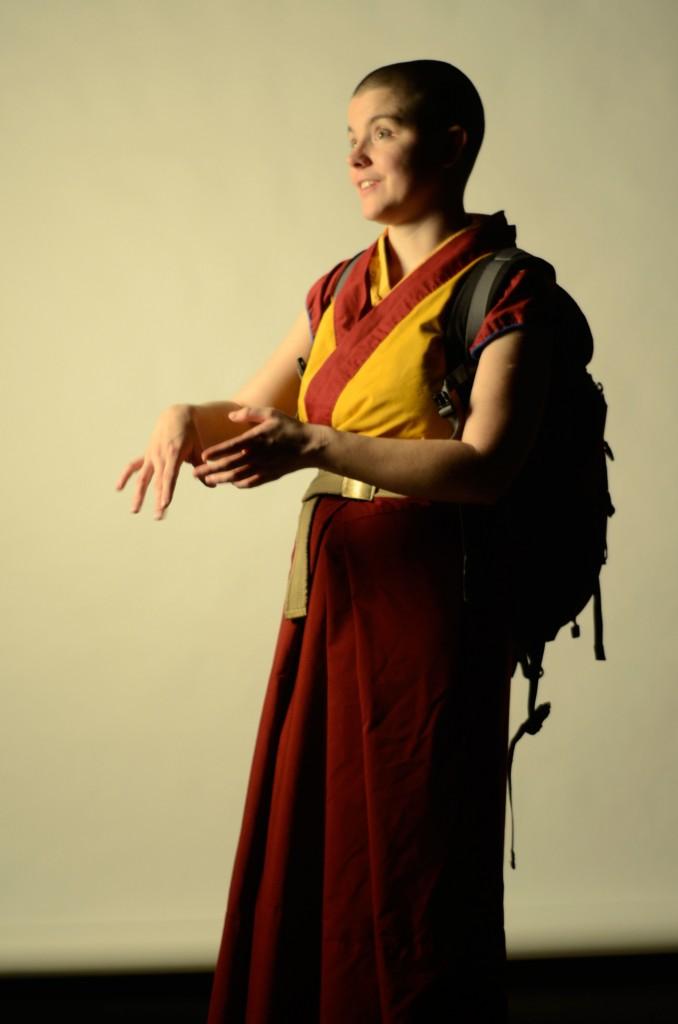
By Kenney Kost/managing editor
For most, the ideals of Buddhism seem as foreign as the lands of its origin. For Kelsang Drolje, who was born Tara Deweese, the teachings and ideals are as second-nature as breathing.
Looking up from her computer desk in the NE Campus graphic design lab with a shaved head and curious brown eyes, Drolje appears no different than any other student except for what she keeps in her bag most days.
“I wear two robes that no one here has seen me wear,” she said. “The yellow one represents wisdom, and the red one represents concentration. You never wear the yellow one without the red because you can’t have wisdom without concentration.”
This is just one example of the symbolism and ritual involved in the Buddhist faith. Though she doesn’t wear her robes every day, Drolje said she should at least notice them, look at them or touch them every day.
The robes she wears at school also have symbolic meaning. The bottom piece, for example, represents moral discipline. She takes them off and puts them on over her head so “we never step out of it, so we never step out of our moral discipline.”
As a child, Drolje kept to herself but was observant of people and her surroundings, said her grandmother, Patricia Deweese. She was also a generous child.
“If she got money for Christmas or a birthday, she would spend it on her sister or family almost all the time,” Deweese said. “I have never seen a child that generous.”
Raised in a Mormon household during early childhood and having attended a Baptist church with her sister as a child, Drolje put a lot of thought into faith and what it means to each individual, Deweese said.
“She didn’t ask a lot of questions as a child,” she said. “But when she did, you could tell it was very well thought out. She would try everything she could to find the answer herself before bringing it up in conversation.”
This desire to dig deeper and find answers on her own is all part of her quest for a faith that made sense to her, Deweese said. Once she started to look into Buddhism, she had many conversations with her grandmother before she took the next step in deciding to attend temple ceremonies.
“She decided to go and really enjoyed it,” Deweese said. “She invited me to go with her, and I went to meet her spiritual guide. I was really impressed with him and his kindness. I am also very impressed with Tara [Drolje] and her dedication to the faith.”
Despite some members of her family being discouraged by her decision to move forward and become an ordained Buddhist nun, Deweese said she is happy for her and feels she was meant for the Buddhist faith.
“She is generous and kind,” Deweese said. “That is how I picture a Buddhist being, so it is a perfect fit for her.”
Growing up in Arlington and staying after high school to work led her to the KMC Texas temple just across the street from Cowboys Stadium.
“It’s an interesting setting for a Buddhist temple,” Drolje laughed. “Some people worship football and some Buddha.”
Drolje worked at KMC for about a year as an assistant administrative director where she handled all of the temple’s day-to-day business outside of the meditation room, she said. It was during this time she realized the teachings of Buddhism aligned with everything she thought about life and moral values.
“I liked the teachings. They made sense to me,” she said. “I had never experienced anything like that before, something that made so much sense. Everything I thought was being taught at my temple, and I just didn’t know there was a religion behind it.”
After working at the temple about a year, she decided to speak with her resident teacher about becoming ordained. He instructed her to devote the next year of her life to practicing as if she were an ordained Buddhist to see if it was, in fact, something she truly wanted to do.
“He said if that’s what I still wanted to do after, then I could get ordained at one of the festivals we have here,” she said.
Becoming ordained is a major undertaking, she said. Lay people can pick and choose what vows they wish to take, but an ordained nun has to take certain vows.
“It’s more about the moral discipline,” she said. “Don’t take intoxicants, no sexual activity, no divisive speech or idle gossip are some of the vows I had to take. I think these are standards that people should live by anyway, minus the no sexual activity.”
All of the many sects of Buddhism branch from two main schools. Hinayana Buddhists work to attain liberation for their own benefit while Mahayana Buddhists work to attain enlightenment for the benefit of all living beings, she said.
“I liked the idea of benefiting others, all living beings, more than myself,” she said. “Yes, we are trying to attain liberation as well because on our path to enlightenment, we will attain liberation. The difference is, we are seeking the liberation in order to attain the enlightenment to benefit all life.”
Though they do meditate, ritualize and pray, Mahayanas try to incorporate the teachings into everyday life. The prayers, meditation and subsequent practice outside of the meditation room are combined to allow for interaction with others.
“How can we make progress if we’re just in meditation constantly?” she asked. “Since our goal is to benefit others, we take meditation off the cushion and into our daily lives. We practice what we’re meditating on in life or at least try.”
Drolje has a tattoo and the markings of a lip piercing she no longer wears because her path includes leaving behind worldly pleasures and worldly beauty, she said.
“We have to be practical,” she said. “We can transform things into the path, like relaxing or wanting like a piece of chocolate. If I am not relaxed, I can get overwhelmed. If I am overwhelmed, I can’t benefit others.”
Drolje is in her second semester at TCC working toward a degree in graphic design she hopes to use to better the temple and its outreach. She said everyone can participate in Buddhism, but it is a practice and not something to be taken lightly.
“It takes a lot of willpower and determination because we have been like this since the beginning of time,” she said. “We’ve been indulging in worldly pleasures for as long as we’ve been alive, and in all of our lives before that, we were constantly working for our own benefit. So it’s a tendency, and within the Buddhist faith, you are attempting to fight all of that off to benefit all living beings.”





























